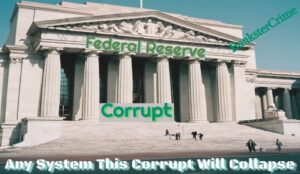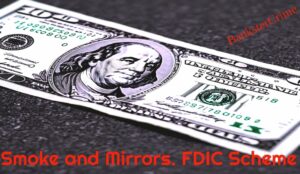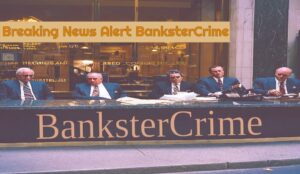
By Pam Martens and Russ Martens: February 5, 2024 ~
Jamie Dimon, Chairman and CEO of JPMorgan Chase
On January 19, Jamie Dimon stunned CNBC viewers when he launched into what sounded like a TV commercial for Republican Presidential candidate and 91-count indictee Donald Trump. Dimon stated:
“Take a step back, be honest. He was kind of right about NATO, kind of right about immigration. He grew the economy quite well. Tax reform worked. He was right about some of China…He wasn’t wrong about some of these critical issues.”
Dimon also said that Democrats need to be more respectful of their fellow citizens that identify as MAGA Republicans.
Former U.S. Labor Secretary Robert Reich was one of the folks who caught Dimon’s act and published a sharp retort the same day, writing:
“Kind of right about NATO? Trump wanted the U.S. to withdraw from NATO — and may get his way if he becomes president again. This would open Europe further to Putin’s aggression.
“Kind of right on immigration? Even the conservative CATO Institute found that Trump reduced legal immigration but not illegal immigration. Trump refused to grant legal status to children of immigrants born in the United States or who grew up in the U.S. He banned Muslims from America, and when the Muslim ban was found to be unconstitutional, banned people from Muslim countries. He fueled the flames of nativism by describing poorer nations as ‘shit holes’ and has used Nazi terms to describe foreigners as ‘poisoning the blood’ of Americans.
“Grew the economy quite well? In fact, under Trump the economy lost 2.9 million jobs. Even before the pandemic, job growth was slower than it has been under Biden. The unemployment rate increased by 1.6 percentage points to 6.3%. The international trade deficit Trump promised to reduce went up. The U.S. trade deficit in goods and services in 2020 was the highest since 2008 and increased 40.5% from 2016. The number of Americans lacking health insurance rose by 3 million. The federal debt held by the public went up, from $14.4 trillion to $21.6 trillion.” (Read Reich’s full column here.)
What has caused Jamie Dimon to appear to be auditioning for the job of advance man for Donald Trump and his MAGA followers?
Dimon is Chairman and CEO of the largest Wall Street mega bank in the United States, JPMorgan Chase. Under Dimon’s tenure, the bank has the dubious distinction of having admitted to an unprecedented five felony counts brought by the U.S. Department of Justice as well as being labeled the riskiest bank by its regulators.
Now Dimon is in a pitched battle with federal banking regulators over their proposed new rules that would make JPMorgan Chase hold more capital against its riskiest trading positions. (This is, after all, the bank that secretly used deposits from its federally-insured Chase Bank to gamble in derivatives in London and lose $6.2 billion. The notorious scandal, known as the “London Whale,” occurred just two years after Congress had passed the Dodd-Frank financial reform legislation in 2010 — legislation that was supposed to rein in the reckless activities of the Wall Street mega banks which had brought on the worst financial crash in the U.S. in 2008 since the Great Depression of the 1930s.)
Running to the aid of Dimon in his battle to stop the proposed new capital rules by federal regulators – which would impact just the 37 banks (out of 4,600) in the U.S. that hold $100 billion or more in assets – is the MAGA-controlled House Financial Services Committee. Its website is so brazenly pro-Trump that yesterday it featured under a heading of “Latest on Twitter” a 2020 Tweet heaping praise on Trump along with a photo of Trump in the Oval Office. (See screenshot to the right.)
On January 31, the MAGA-dominated House Financial Services Committee held a hearing on the proposed new capital rules under the biased title: “Rules Without Analysis: Federal Banking Proposals Under the Biden Administration.”
The witness panel was stacked three-to-one against an honest debate on the topic. The one speaker who was not a lobbyist, law firm or sycophant for Wall Street mega banks was Professor Jeremy Kress, Assistant Professor of Business Law at the Stephen M. Ross School of Business, University of Michigan. (Clearly, Democrats were allowed to select just one of the four witnesses on the panel.) Professor Kress told the Committee the following:
“The pending Basel III Endgame rules will foster— not threaten—credit availability, as most of the proposed capital increase is associated with large banks’ trading and fee-generating businesses—not their lending activities—and the risk-weights for many categories of traditional loans actually decrease under the proposal…
“…the banking sector is trying to invent new legal standards in a brazen attempt to defeat these rules. Requiring banks to fund themselves with more equity will not impair credit availability, but it will modestly reduce bank stock prices, share buybacks, and executive compensation. To avoid this outcome, large banks are attempting to hold their regulators to legal standards that simply do not exist. Congress has subjected rulemaking by some agencies, including the Securities and Exchange Commission, to various types of cost-benefit tests. However, Congress has not imposed any cost-benefit requirement on the federal banking agencies. And for good reason: quantifying the benefits of a banking crisis averted is a nearly impossible task. The law that does govern rulemaking by the federal banking agencies—the Administrative Procedure Act—requires only ‘reasoned decision making,’ a standard the current proposals assuredly meet. Indeed, the level of analysis in the current proposals is at least equal to, and in many cases exceeds, prior federal banking agency rules. Make no mistake: if the current proposals are legally deficient, so too are the vast majority of the de regulatory rules adopted under the Trump Administration with far less reasoned analysis.”
Jamie Dimon has been able to keep his job at the helm of JPMorgan Chase because his Board of Directors has chosen to look the other way at how Dimon keeps the stock price moving higher despite a Rap Sheet that rivals an organized crime family. As Professor Kress points out, under the proposed new capital rules the Wall Street mega banks would have to reduce their spending on share buybacks to prop up their share prices and use at least part of that money instead for an accounting category called “retained earnings,” which increases equity capital at the bank and helps to prevent taxpayer bailouts.
Over the past decade, from January 1, 2014 through December 31, 2023, Dimon has overseen $116.8 billion in stock buybacks of JPMorgan Chase stock as his Board made Dimon a billionaire with stock options. (Not shown in the first link in this paragraph is the $2.3 billion JPMorgan Chase spent in the fourth quarter of 2023 on buybacks — per the 8K the bank filed with the SEC.)
In another move that shows Dimon is getting nervous about banking regulators breathing down his neck, Dimon announced in October that he and his family planned to sell a whopping one million shares of their JPMorgan Chase common stock.

Be gentle with your skin. Our soaps are kind to your skin and create a creamy, silky lather that is nourishing. Small batches are made by hand. We only use the best natural ingredients. There are no chemicals, phthalates, parabens, sodium laurel sulfate, or detergents. GraniteRidgeSoapworks
To Get 20% Of Use Coupon Code Bankster20 Or HNews20
![]()





